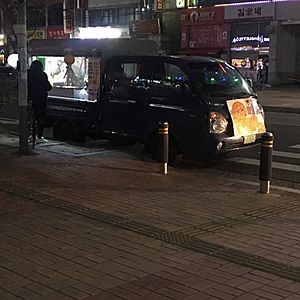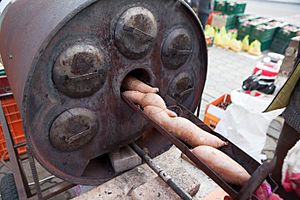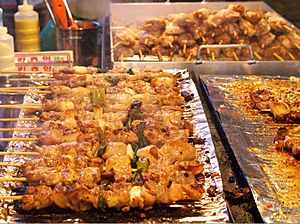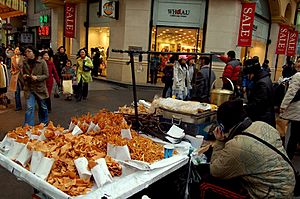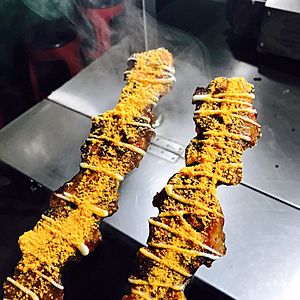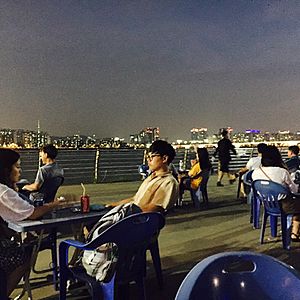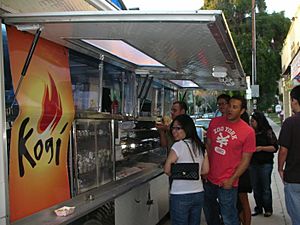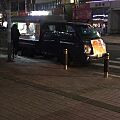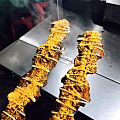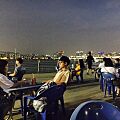Food trucks in South Korea facts for kids
Many food trucks are popular in South Korean cities. Some, like ice cream trucks, sell frozen treats or pre-made food. Others have full kitchens inside and cook fresh meals. You can often find Sandwiches, hamburgers, french fries, and other quick and tasty foods. Recently, food trucks offering fancy or international dishes have become super popular, like mini pop-up restaurants on wheels! Food trucks, along with small food booths and food carts, are a big part of the street food scene that feeds billions of people every day.
Contents
Food Trucks in South Korea: What's Happening Now?
Starting a food truck business can be cheaper than opening a regular restaurant. The government of South Korea made food trucks legal in September 2014. Since then, more and more food trucks have appeared! Many young people are trying out this business, and you can find a huge variety of foods. However, food trucks can't just set up anywhere. In Korea, there are only certain spots chosen by each local government where they are allowed to operate.
Rules for Food Trucks in Korea
Food trucks in Korea must tell their local office that they are open for business. If a food truck doesn't do this, it's considered illegal. Legal food trucks can only sell in specific places like licensed facilities, tourist attractions, sports stadiums, urban parks, and near streams. A legal food truck must also have its business permit clearly displayed. If it doesn't, it might be seen as illegal.
The government is trying to help legal food trucks grow. After making them legal in 2014, they looked at the rules again in 2016. They wanted to make it easier for food trucks to move around more freely. This was to help solve problems for the food trucks that followed all the rules.
There are also rules about the size of the cooking area inside the truck. The height of the cooking space must be less than 1.5 meters (about 5 feet). The cooking area itself should be at least 0.5 square meters (about 5.4 square feet).
How Food Trucks Get Started in Korea
The Korean Government shared a guide in 2014 for how food trucks should operate. This guide covers how to start a business and how to keep food safe and clean.
Step 1: Picking a Good Spot for Your Food Truck
When deciding where a food truck can set up, officials look for places that are:
- Not too crowded, so people have space.
- Away from traffic, so cars can move easily.
- Clean, with good ways to get rid of trash.
- Where the truck can get electricity and water.
- Safe from pests like insects.
- Not too close to other businesses that might be affected.
- Near restrooms for customers.
Step 2: Choosing Food Truck Operators
- Local governments can choose who gets to run food trucks and make agreements with them.
- Private companies can also set their own rules to pick food truck owners and sign contracts.
Important things to know:
- Getting Your Permit: Once a food truck owner has a business registration card, the health department gives them an approval.
- Having Your Truck Ready: At first, when food trucks became legal, owners had to have their truck ready when they applied. This was to make sure people who didn't win a spot didn't lose money on a truck they couldn't use.
Step 3: Confirming Sales
When a food truck owner shows their business permit, they get a confirmation that they can start selling. For private spots, the contract itself can be enough.
Step 4: After the Truck Starts Selling
- If a food truck breaks the rules about where or when it can sell, especially in tourist areas, it might lose its contract.
- Breaking the "Food Hygiene Act" (rules about food safety) can also lead to problems.
How South Korea Helps Food Trucks Grow
Seoul's Efforts to Boost Food Trucks
The city of Seoul has been working to help food trucks succeed. In March, there were over 424 food trucks reported in Seoul. However, many food truck owners faced challenges. They found it hard to find good places to sell that would bring in steady customers. Sometimes, existing businesses didn't want new food trucks nearby. Also, many food trucks only sold at special events or festivals, which made it hard to earn money regularly.
To help with these problems, Seoul plans to find 53 new places for food trucks. These spots include parks and areas along the Han River. They also want to expand night markets to have more food trucks. Seoul's goal is to have 800 food trucks by next year! The city is also asking local governments to make sure festivals set aside space for food trucks. They want to help food trucks and traditional markets work together. Seoul's mayor even said he wants at least 1,000 food trucks in Seoul, which could create many jobs.
Gyeonggi Province Supports Food Trucks
Gyeonggi Province is also helping food trucks, especially to support young people and those who need a boost to start a business. They even tried operating food trucks at the provincial office building. Even though rules usually don't allow food trucks near places with big cafeterias, they did this to see how they could expand food truck locations.
Officials believe that food trucks can create jobs for people who are struggling. They also want to change how people think about food trucks. Some people worry about cleanliness, but officials say food trucks are built to standards and get regular health checks.
Gyeonggi Province wants to change rules that limit where food trucks can sell. Right now, they are mostly allowed in parks, sports facilities, and tourist spots. The province wants to add more places, like public facilities, to help food trucks find more customers. They are also trying to get officials and community leaders to have a more positive view of food trucks.
Another goal is to make it easier for people with less money to start food truck businesses. Current rules sometimes make it hard for them to get permits for public spaces. The province will suggest changes to these rules to the government.
Popular Street Foods in Korea
Many delicious dishes are sold from food trucks and carts in Korea. Here are some famous ones:
Beondegi
Beondegi (번데기) are actually silkworm pupae! This unique Korean street food is boiled or steamed and served in paper cups with toothpicks.
Dak-kochi
Dak-kochi means chicken skewer. These are pieces of chicken grilled on a stick. Sometimes they have a tasty sauce on them. Most are made with chicken breast, but other parts of the chicken are also used.
Amook
Amook are Korean fishcakes. They can be steamed, roasted, or fried. You can find many different kinds of fishcakes.
Gimbap
Kimbap is a popular Korean roll. It's made with rice and various fillings like pickled radish, eggs, and other vegetables, all rolled up in seaweed. It's then sliced into bite-sized pieces.
Tteok-bokki
Tteok-bokki is a very famous Korean dish made with soft rice cakes. It's usually spicy and cooked in a flavorful sauce with vegetables. It's a classic Korean street food.
Gungoguma
Gungoguma is a popular Korean street food. It's simply sweet potatoes roasted inside big drums.
Bungeo-ppang
Bungeo-ppang literally means "fish bread." It's a fish-shaped pastry filled with sweet red bean paste or custard cream. Koreans often enjoy this in winter. However, it's becoming harder to find because the cost to make them has gone up.
Popular Food Truck Zones
Myeongdong Food Truck Zone
Myeongdong is a very busy area in Seoul, so it has many food trucks. Prices usually range from 2,000 to 5,000 won (about $1.50 to $4). You can find all sorts of foods here, like tornado potatoes, egg bread, fruit juice, kebabs, roasted corn, octopus skewers, dumplings, and even fancy items like lobster and steak!
Noryangjin Food Truck Zone
Noryangjin is another area in Seoul, famous for its fish market and many study centers. Students who are preparing for exams often eat from food trucks here to save time and money. This makes the food truck business very busy.
The most famous food here is Cup Bbap (cup rice). This is a dish like bibimbap or kimchi fried rice served in a cup. It's usually cheap, costing about $3 to $5. You'll often see students eating cup-bap while standing in front of the food trucks. Noryangjin street food is known for being affordable and quick.
Gangnam Food Truck Zone
The area between exits 9 and 10 of Gangnam Station became very popular for food trucks after being featured on the TV show Baek Jong-won's Food Truck. Many people line up to buy food here. Even after the show, it's still a busy spot.
- Location: Between exits 9 and 10 of Gangnam Station.
- How to Get There:
- Get off at Gangnam Station (Line 2) and use Exit 9 or 10.
- Get off at Sinnonhyun Station (Line 9) and use Exit 6.
Andy Candy Cotton Candy
This food truck sells unique cotton candy. Their "Britto cotton candy," which mixes Mexican food ideas with cotton candy, is very popular. You can usually only order one Britto cotton candy per group.
- Recommended Menu:
- Icecream cotton candy: 3000 won
- Luminous cotton candy: 3000 won
- Britto cotton candy: 3000 won
Hatffle
'Hatffle' is a food truck in Gangnam that sells different kinds of waffles. Their waffles are known for being soft and delicious. Many office workers and students near Gangnam Station enjoy these desserts, so there can be a long wait.
- Recommended Menu:
- Nutella / whipped cream waffle: 2500 won
- Icecream waffle: 3000 won
- Brunch waffle: 3500 won
Connells Hot Dog
'Connells hot dog' sells various hot dogs. This place was already known, but it became even more famous after getting help from Baek Jong-won on his TV show. They are known for having many ingredients and different sauces.
- Recommended Menu:
- Sweden Chili hot dog: 4000 won
- Sweden Cheese hot dog: 4000 won
- Sweden Chili Cheese Hot Dog: 5000 won
Chicken Skewers in My Heart
This chicken skewer food truck in Gangnam Station is run by a Korean entertainer named Lee Hoon. After facing difficulties in business, he found new hope with this food truck. He also inspired many people by donating some of his earnings to small business owners and young entrepreneurs.
- Recommended Menu:
- Salt flavor chicken Skewers: 3000 won
- Teriyaki flavor chicken Skewers: 3000 won
- Tears flavor chicken Skewers: 3000 won
Suwon Food Truck Zone
You can find many food trucks operating at Ji-dong Bridge in the Suwon Nammun Market. Young entrepreneurs, aged 20 to 39, can rent food trailers from Suwon City Hall. The trucks operate from 5 PM to 10 PM. To protect existing market sellers, food trucks cannot sell the same items as nearby shops.
A challenge for this food truck zone is that some trucks do very well, while others struggle. The TV show 'Baek Jong-won's Food Truck' tried to help solve this problem.
- Location: Ji-dong Bridge, between Yeongdong Market and Ji-dong Market.
- Number of Food Trucks: About 8-10.
Some popular items you might find:
- Cream Spoon: Cream noodle Topokki (4,000won), Spicy soup Topokki (3,500won), Coconut cream shrimp (5,000won)
- Taiwan Night Market: Cheese potato (4,000won), French fries (3,000won), French fries with chili cheese (5,000won), Fish and chips (4,000won)
- Cheese ON THE Steak: Mini steak 70g (4,000won) & steak (7,000won)
- Eulaschacha: Light bulb juice (Pink lemonade, lemonade, Grapefruit-ade, Traditional tea, etc.)
- Cooking Laboratory: Meatball boiled in soy sauce, Wingbong boiled in soy sauce
- Baleunkkochi: Chicken Skewers
- Fantastic Noodle: Barbeque, Barbeque ramen, Spicy seafood ramen
- HERS KITCHEN: Garlic cube steak, Beef sushi
Han River Food Truck Zone
The Bamdokkaebi night market, especially along the Han River, has become very popular. Food trucks at these markets are attracting a lot of attention as a way to start a business. The number of food trucks at the Bamdokkaebi night market has grown a lot in recent years.
Some of the food trucks you might find at the Han River night market include: Shrimp King, Couple Chicken, AB CAFE, Sweet traveling today, KOREAN FOOD, Crepe Hong uncle, Rider's Park, Marine Mali, Gangnam bully, and more.
Food Trucks at College Campus Festivals
Food trucks are now allowed to sell on college campuses! Universities can sign agreements with food truck owners, and then the owners just need to submit paperwork to the local government.
In April, the Food and Drug Administration (KFDA) changed its rules to allow this. Before, food trucks could only operate in places like tourist spots or parks. Now, they can also be at universities if they have a contract with the school. This gives students a chance to start businesses and learn about the food industry. Some car companies and universities are even working together to support campus food trucks.
Baek Jong-won's Food Truck TV Show
Baek Jong-won's Food Truck is a TV show that started in July 2017 on SBS TV. Baek Jong-won is a very famous restaurant owner in South Korea. This show is a reality program where Baek Jong-won watches and helps food truck owners who are having trouble making money. The show is very popular, with an average of 5% viewer ratings. This shows how much Koreans love food trucks and street food. Korea has a long history of street food, with dishes like Tteokbokki (stir-fried rice cake) being popular since the 1960s.
Korean Food Trucks Go Global
In the past, many food trucks offered similar menus and looked alike. But now, food trucks are much more diverse! You can find all kinds of foods, like takoyaki, tacos, Cuban sandwiches, New York hot dogs, steak, and shrimp. Not only can you taste foods from different countries, but many food trucks are also creating fusion dishes that mix Korean food with other styles. These unique menus are becoming popular around the world. This helps to spread Korean food and culture globally.
Korean Wave and Korean Food Trucks
Kogi Korean BBQ
Kogi Korean BBQ became very famous in Los Angeles. It changed the idea of what American food trucks could be. Their main dishes are Tacos and Burritos. But instead of typical fillings, they use Korean BBQ meats like Bulgogi and Korean pork belly.
Kogi became so popular because it combined Korean and Mexican flavors. They also used social media very well. They would share their weekly schedule and where the food truck would be next. This made it exciting for people to follow them and find out where they would show up.
Stew Luck
Stew Luck is a Korean-style food truck that aims to share amazing Korean food with the world. They became a top Korean food truck with support from the government. Their menu includes spicy steamed chicken, sweet chestnut steamed dishes, and ribs tacos. They take traditional Korean flavors and combine them with foreign dishes, helping to brand Korean food naturally.
Miss Corea
Miss Corea is a food truck that sells kimchi fried rice. They make it special by cooking it in a cast iron pot. They also add ingredients that foreigners are familiar with, like fried eggs, spam, and sausage. This makes kimchi fried rice more approachable for people who might not know Korean food well.
Korilla BBQ
Korilla BBQ is a popular food truck in New York. They gained fame on a US TV show called 'The Great Food Truck Race.' Like Kogi, they use Twitter every morning to announce their hours and locations. They offer dishes like burritos, rice bowls, and tacos, but with Korean ingredients like roasted meat, spicy pork, tofu, and kimchi fried rice. This gives customers a mix of familiar and new flavors.
Images for kids
 | Anna J. Cooper |
 | Mary McLeod Bethune |
 | Lillie Mae Bradford |


